Hitchcock Blu-ray Movie
HomeHitchcock Blu-ray Movie 
Blu-ray + DVD + UV Digital Copy20th Century Fox | 2012 | 98 min | Rated PG-13 | Mar 12, 2013
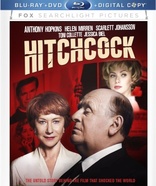
Movie rating
6.8 | / 10 |
Blu-ray rating
| Users | 4.1 | |
| Reviewer | 3.5 | |
| Overall | 4.1 |
Overview
Hitchcock (2012)
A dramatized story on the relationship between director Alfred Hitchcock and his wife Alma Reville during the making of Psycho.
Starring: Anthony Hopkins, Helen Mirren, Scarlett Johansson, Danny Huston, Toni ColletteDirector: Sacha Gervasi
| Biography | Uncertain |
| Drama | Uncertain |
Specifications
Video
Video codec: MPEG-4 AVC
Video resolution: 1080p
Aspect ratio: 2.40:1
Original aspect ratio: 2.39:1
Audio
English: DTS-HD Master Audio 5.1
French: Dolby Digital 5.1
Spanish: Dolby Digital 5.1
Subtitles
English SDH, Spanish
Discs
50GB Blu-ray Disc
Two-disc set (1 BD, 1 DVD)
UV digital copy
DVD copy
Packaging
Slipcover in original pressing
Playback
Region A (locked)
Review
Rating summary
| Movie | 3.0 | |
| Video | 4.5 | |
| Audio | 4.5 | |
| Extras | 3.5 | |
| Overall | 3.5 |
Hitchcock Blu-ray Movie Review
Mr. & Mrs. Hitch
Reviewed by Casey Broadwater March 14, 2013Moviegoers may know that Peter Jackson lost a lot of weight, recognize Steven Spielberg by his beard and glasses, or complain in the break room that
Ben Affleck didn't get the Oscar nod for Argo, but outside of ardent cinephiles and auteur theorists, most audience members don't give much
thought to the directors of their favorite movies. Alfred Hitchcock, however, was—and continues to be—different. His public persona is nearly as
recognizable as his films. The erudite Master of Suspense. The portly showman in silhouette. The control freak, obsessed with steely blondes and
mommy issues. He's a practically mythic figure, an enduring enigma, and as worthy a subject as any for a biopic.
Based on Stephen Rebello's book Alfred Hitchcock and the Making of Psycho, the movie Hitchcock—helmed by narrative feature
newcomer Sacha Gervasi—follows a short stretch in the director's life in an attempt to demystify the man behind the iconic jowls and upturned nose.
Considering its subject matter, the film is oddly and unfortunately lightweight, centering around the mostly fictional domestic tension between Hitch
and his wife, Alma, instead of giving us the real on-set nitty-gritty. This was partially a matter of necessity, apparently—the production was unable to
get the rights to show or directly recreate any recognizable shots from Psycho—but it will come as a disappointment to those hoping for a more
in-depth, nuts and bolts-style meta-movie. Still, Hitchcock is enjoyable as a kind of low-intensity melodrama about Hitch's mid-life creative
crisis,
and
it's worth seeing for star Anthony Hopkins' transformation into the corpulent future Sir Alfred.
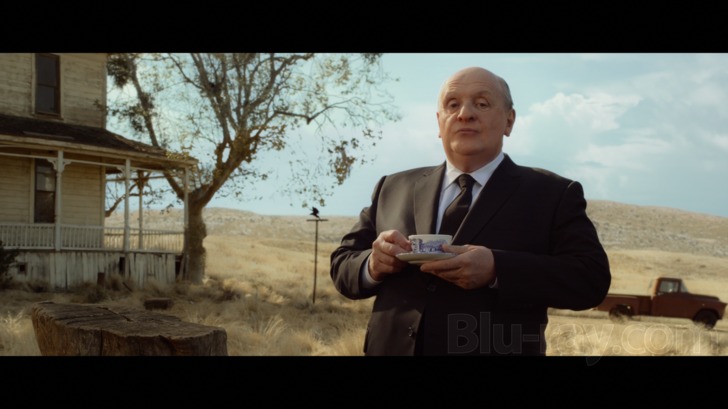
The film opens after the successful 1959 premiere of North by Northwest, where Hitch exits the theater and is stopped dead in his tracks when a reporter asks him, "Shouldn't you just quit while you're ahead?" Hitchcock's overarching theme is solidified the next morning, as the whale-like director soaks in a tub he barely fits and jealously reads a newspaper article about "The New Masters of Suspense," profiling Henri-Georges Clouzot and Claude Cambrol. Most critics assume he's past his prime, but Hitch is determined to prove them wrong. It's just a matter of finding his next film. He tells his assistant, Peggy Robertson (Toni Colette, in cat-eye glasses), that he's looking for "a nice, clean, nasty piece of work," and she comes up with Robert Bloch's Psycho, a lurid new novel loosely based on the crimes of recently discovered murderer/grave-robber Ed Gein. The shocking story is outside Hitch's usual, sophisticated thriller territory, and he gravitates towards it precisely for this reason, despite the objections of nearly everyone he knows, including his agent (Michael Stuhlbarg), Paramount head honcho Barney Balaban (Richard Portnow), and his wife and writing/editing partner Alma (Helen Mirren), who dismisses it as B-movie horror material. Hitch counters with, "But what if somebody really good made a horror picture?"
Paramount refuses to back the movie, but Hitch at least negotiates a distribution deal after he and Alma mortgage their mansion to finance the project themselves. Filming begins on the studio lot, with closeted actor Anthony Perkins (James D’Arcy) cast as the mommy-loving Norman Bates, Janet Leigh (Scarlett Johansson) as Marion Crane—the on-the-lam secretary who makes an unfortunate rest stop at the Bates Motel—and Vera Miles (Jessica Biel) as Marion’s worried sister, Lila. Hitchcock takes us on set only periodically. We witness the shooting of the infamous shower scene and watch as Hitch spies—much like Norman does in the film—through a peephole in his office on Vera, whom he resents for turning down the leading lady role in Vertigo in favor of having a child. We see trace evidence of the director’s tyranny in his borderline psychological abuse of Janet —“Compared to Orson Welles, he’s a sweetheart,” she demurs—but also look on as he gives inspired stage direction to the nervous Perkins. Elsewhere, Hitch asserts his dominance with the puritanical Hays Office censor Geoffrey Shurlock (Kurtwood Smith) and shuts out the harried Balaban, who’s denied access to the film’s dailies.
This stuff is fascinating—a look at the inner workings of the movie biz and a master plying his craft—but in an effort to humanize, Hitchcock goes off the Paramount lot and spends a bit too much of its runtime on the commonplace conflicts of the director’s uneasy home life. (Conflicts that were either invented entirely for this film or else extrapolated and embellished from what is known about their relationship.) Alma nags the overweight Hitch about his eating decisions and forces him to get some exercise trimming the hedges, but she really does have his best interests in mind. She’s a constant in his life, offering creative support and even tolerating his obsession with his actresses. Their marriage strains, however, when Alma begins working on a screenplay at the seaside writing cottage of her suave and slightly younger pal, writer Whitfield Cook (Danny Huston), whom Hitch regards as a talentless hack. Feeling pushed aside by her husband’s single-minded dedication to Psycho, Alma has a kind of emotional affair with Cook—long phone conversations, coastal highway rides in his convertible, casual flirting—while Hitch grows increasingly paranoid that the two are getting physical. This anxiety, in turn, fuels much of Hitch’s on-set rage. Not that any of this is known to have happened.
The other misstep Hitchcock makes is in having Ed Gein himself (Michael Wincott) show up as a mental phantom who haunts Hitch’s dreams and—in one dippy scene—even acts as the director’s note-jotting psychoanalyst, listening to him rant about how he’s resented and unappreciated in Hollywood. The conceit just doesn’t play well; it’s an out-of-place gimmick meant to add some Hitchcockian suspense and gallows humor to an otherwise straightforward and realistic film.
Hitchcock wants to get inside the director’s head, but ironically, the film will probably be best enjoyed by those who don’t have much interest in Hitch’s inner life—or even familiarity with his films—and who just want a soft drama set during the late golden age of Hollywood. More successful as a well-adorned period piece than a psychological profile, the film is certainly handsomely made, from the Mad Men-era attire to the A-level cast. Scar-Jo and Biel don’t have especially much to do, but they’re great in their small roles, and James D’Arcy does a dead-on Anthony Perkins. Of course, the other Anthony is the big draw here, and while he’s not a perfect match for Hitchcock, looks-wise, between Greg Nicotero's prosthetic effects work and Hopkins’ homage of a performance—which stays away from caricature—the film does capture the spirit of the director’s larger-than-life personality. The real reason to watch, though? Helen Mirren. Look out for the scene where Alma takes all of her husband’s criticisms and throws them back in his face—it’s Hitchcock’s dramatic high point.
Hitchcock Blu-ray Movie, Video Quality 
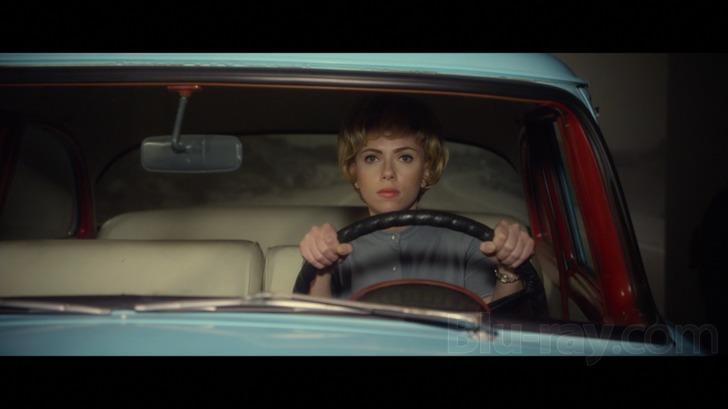
Shot digitally with Red Epic cameras by The Girl with the Dragon Tattoo cinematographer Jeff Cronenweth, Hitchcock may not have the filmic grain or Technicolor depth of an original Hitch picture, but it still looks fantastic in high definition. The 1080p/AVC-encoded presentation is free from distractions—no compression problems, no overzealous edge enhancement, no DNR filtering—and I suspect the 2.35:1-framed picture is entirely true to intent. The color grading is warm and dense, with bright hues and creamy, nostalgia-tinged highlights, and contrast seems spot-on. I did notice some softness in some of the medium-length shots, but this could be an aesthetic choice to keep the film from looking too sharp and modern. Otherwise, clarity is excellent, and close-ups reveal the expected level of fine detail. Beyond some visible source noise in some of the interior scenes, you'd really have to nitpick to come up with any complaints here.
Hitchcock Blu-ray Movie, Audio Quality 
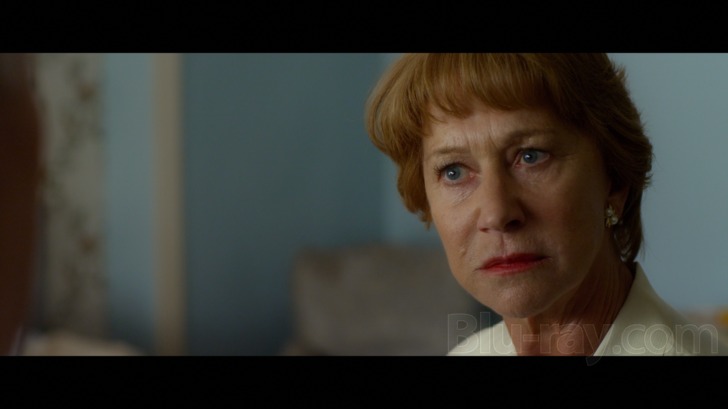
The film features a lossless DTS-HD Master Audio 5.1 surround track that's every bit as lush as the cinematography. The core of the experience is Danny Elfman's orchestral score, which sometimes imitates the style of Hitchcock's go-to composer, Bernard Herrmann, but usually goes for Elfman's usual driving mix of drama and whimsy. The music sounds excellent—full and clear—and is usually spread near-equally through all channels. The film's sound design is limited by the fact that this is a fairly quiet drama, but you will hear frequent ambience in the surround channels—pouring rain, studio lot clamor, etc.—along with occasional directional effects. Dialogue is always cleanly recorded, well-mixed, and easily understood. The disc also includes an English descriptive audio track, Spanish and French Dolby Digital 5.1 dubs, and English SDH and Spanish subtitles.
Hitchcock Blu-ray Movie, Special Features and Extras 
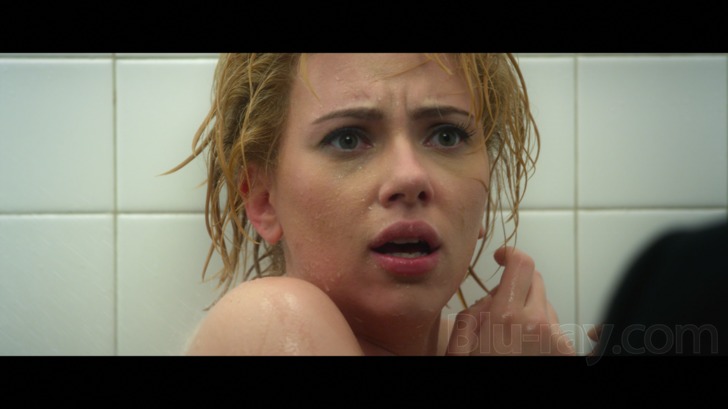
- Audio Commentary with Sacha Gervasi and Stephen Rebello: The film's director and the writer of book on which it's based talk shop, covering their own personal introductions to Hitchcock, the director's oversized personality, and anecdotes about the film's production, from the wasps and bees at the Ed Gein house location to the necessity of casting The Karate Kid (Ralph Macchio) as Psycho's screenwriter Joseph Stefano. Their chat might just be more interesting than the film itself.
- Deleted Scene (HD, 1:41): Director Sacha Gervasi introduces a single deleted scene, with Hitch on the couch talking to his psychotic psychologist.
- Becoming the Master: From Hopkins to Hitchcock (HD, 12:28): A featurette about Hopkins' transformation, from the makeup effects to the hairdressing to the actors' personal research into the director. There's a real emphasis here on not trying to create a perfect reproduction of Hitchcock, but capture his spirit.
- Obsessed with Hitchcock (HD, 29:09): An extensive making-of documentary that covers every aspect of production—from the adaptation and casting to the makeup effects—and features interviews with everyone involved. Well worth watching.
- Sacha Gervasi's Behind-the-Scenes Cell Phone Footage (HD, 13:31): There's some cool stuff here—Hopkins getting his face molded, snippets of conversation with the crew—but a director should know better than to shoot all his cell phone footage vertically.
- Hitchcock Cell Phone PSA (HD, 00:41): If you've been to the theater in the past six months, you may have seen this PSA, using footage from the film, about not texting in the cinema.
- The Story (HD, 3:54): An EPK-style featurette about the film's story.
- The Cast (HD, 4:25): Likewise, a short piece with interviews with the director, Hellen Mirren, Anthony Hopkins, and other members of the cast.
- Danny Elfman Maestro (HD, 2:16): Some footage from inside the studio where the score was recorded.
- Hitch and Alma (HD, 3:15): A short summing up of the relationship between Hitchcock and his wife.
- Remembering Hitchcock (HD, 4:44): Some of Hitchcock's former cast and crew members—including Veronica Cartwright—reminisce about working with the master.
- Theatrical Trailer (HD, 2:33)
- Sneak Peek (HD, 14:31)
Hitchcock Blu-ray Movie, Overall Score and Recommendation 
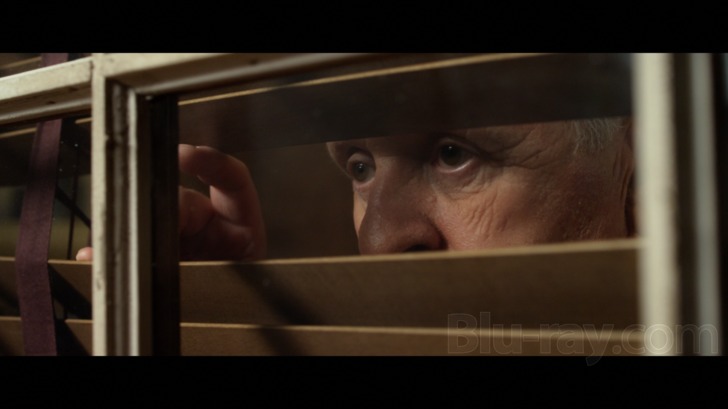
Perhaps not the be-all-end-all meta-movie that fans of the Master of Suspense were hoping for, Hitchcock is nonetheless an enjoyable—if lightweight—drama about creative partnership, ambition, and proving the naysayers wrong. What it lacks in psychological substance, it slightly makes up for with period piece savviness and fine performances from all involved, especially Anthony Hopkins and Helen Mirren. 20th Century Fox's Blu-ray release is all-around excellent, with a solid A/V presentation and plenty of extras, so as long as your expectations are in check, I see no reason not to give Hitchcock a go. Recommended.
Similar titles
Similar titles you might also like

Steve Jobs
2015

Trumbo
2015

Vice
2018

On the Basis of Sex
2018

The Front Runner
2018

Marshall
2017

All Is True
2018

Lovelace
2013

Molly's Game
2017

Stan & Ollie
2018

No Man of God
2021

I Am Woman
2019

A Private War
2018

Can You Ever Forgive Me?
2018

Colette
2018

Christine
2016

Jimi: All Is by My Side
2013

A Prayer Before Dawn
2017

The Theory of Everything
2014

Lee Daniels' The Butler
2013
